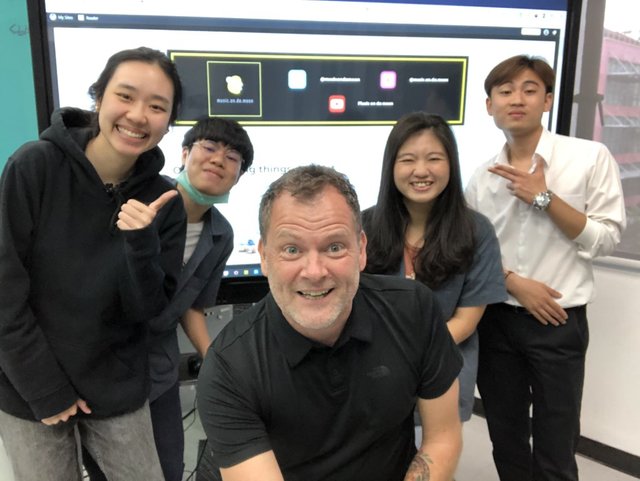
It was my last teaching session today at Srinakharinwirot University, and the last session looking at social media with the concert engineering students. Our focus today was podcasting. I'd been itching to create a podcast with them since I arrived three weeks ago, so this was a good opportunity to pull the different threads together and create a programme that was run and managed by the students themselves.
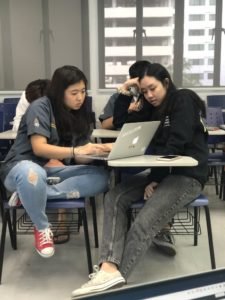
Having no experience, nor being very familiar with the concept of podcasting we had to start at the beginning and think about the way that online audio content is generally produced and shared. We talked about how podcasting is nothing new, but has a long history as part of the development of the internet as an integrated set of media platforms. We noted two essential elements that got podcasting going, the development of the mp3 audio compression standard, and the widespread use of the RSS syndication protocol to alert subscribers to a feed that new content had been uploaded and was ready to share.
We also compared podcasting as a media form to that of its main predecessor, radio. The way that they share similar characteristics, such as primarily being audio-led content, and the way that we can do other things while we are listening, such as jogging, driving or doing the dishes. What marks podcasting out, however, is its relative freedom from set formats and timescales. A podcast can be episodic and can last for whatever time the producers deem to be relevant. Though listeners may struggle with content that goes beyond an hour, or is too free-form.
A podcast doesn't need to use a proscriptive script, but we still felt that it would be better if it had a structure. So using the tried and tested method of designing a radio clock, we broke the hour down into segments, identified when music would be played, and what would be the speech content in each of the talk sections. Each would lead on a theme, and would contribute and ask questions to help develop their spoken English skills.
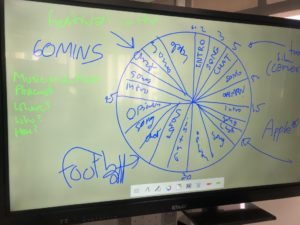
We also considered what equipment we would need to produce a podcast. I came with my Zoom H6n recorder, which is a very capable, compact and adaptable recording device, that allows for four microphones to be directly connected to the recorder, and additional input connections to be added as needed. The controls of the Zoom recorder are also very simple and intuitive, so the students quickly picked up on using the recorder without any bother. We also added a line-in feed from one of the student's phones, so they could play music tracks.
We had a practice before lunch, then afterwards my only instruction was to collect the kit from my bag, set it up and have a go at recording something. And with no questions asked, no double checking that is what they did. They set the equipment, checked the levels, used their scripts to follow their previously mapped pathway, and then record what they were going to chat about. The stipulation was that there would be no edits, and that any mistakes, pauses or fluffs would be left in.
It was really encouraging to see how the students responded to this exercise. They had only been introduced to the concept of a
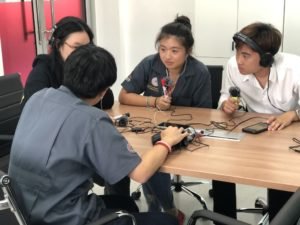
podcast earlier in the morning, but here they were spontaneously creating their own podcast with no doubting themselves, and no asking for help, clarification and reassurance. The result, which you can listen to below is honest and caring in the way it expresses what the interest of the students are at this time, based on the expressive and descriptive language skills that they have. I'm very pleased with the result.
I can't believe that this was the last session of a three-week block, and that it's time to move on to other things. We've covered a lot in these sessions. We've had to get to know one another from scratch, and we've had to learn to use concepts, techniques and equipment that was not quite familiar before we started. I'm hoping that the students continue to create and share content for their Music On Da Moon blog, and that they keep sharing their ideas about the media, music and stuff that they are interested in. It gives me a reference-point to follow when I come back to Bangkok, and something to remind me of my time here, and what I might be missing when I return to the UK.
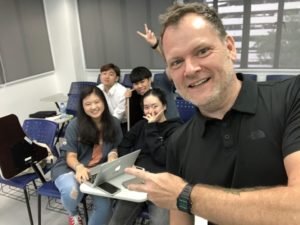
Posted from my blog with SteemPress : https://decentered.co.uk/music-on-da-moon-podcast/
Congratulations @decentered-media! You have completed the following achievement on the Steem blockchain and have been rewarded with new badge(s) :
You can view your badges on your Steem Board and compare to others on the Steem Ranking
If you no longer want to receive notifications, reply to this comment with the word
STOPVote for @Steemitboard as a witness to get one more award and increased upvotes!
Downvoting a post can decrease pending rewards and make it less visible. Common reasons:
Submit